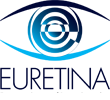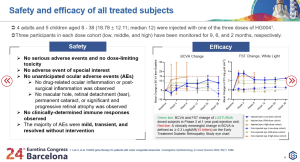HuidaGene Therapeutics, based in Shanghai, China and Clinton, New Jersey, have reported preliminary data on a novel gene therapy treatment for RPE-65 LCA (Leber congenital amaurosis). The experimental treatment, named “HG004” (AAV-hRPE65), has indicated that safety and efficacy presented a good safety profile without drug-related serious adverse events or dose-limiting toxicity. The company indicated that HG004 showed comparable efficacy results to the approved voretigene neparvovec(Luxturna), approved in 2017 in the FDA and in 2018 in the EMA. HuidaGene Therapeutics reported that HG004 has been received both orphan drug designation (ODD) and rare pediatric disease designation (PPDD).
LCA is a severe congenital or early infant-onset form of non-syndromic retinal disease characterised by severe retinal dystrophy, vision loss, nystagmus, an absence of a normal pupil response and an almost non-recordable ERG. LCA was originally identified by a German clinical ophthalmologist, Theodor von Leber in 1869 and this disorder was primarily based on the early infant-onset form of non-syndromic inherited visual loss. However, following the original description of the infantile disorder, a subsequent milder form of the same disease presented in the 6th and 7th years of life and led to blindness by the age of 30 years, considered to be on the same spectrum as LCA. This later-onset disease has been referenced by several different names including juvenile and early-onset retinitis pigmentosa, childhood-onset severe retinal dystrophy, Early Onset Severe Retinal Dystrophy (EOSRD) and Severe Early Childhood Onset Retinal Dystrophy (SECORD). Most recently, LCA pathologies are generally based on the genotype and there are over 25 genes causative for LCA. Treatment of LCA2-RPE65 by voretigene neparvovec (Luxturna) has been approved since 2017 and while this was a paradigm shift for the genetics and ophthalmic communities, more recent real-world data are now presenting an expansion of data since the original 2017 approval, including from Prof. M. Dominik Fischer, University of Oxford, also presented at the EURETINA Congress (entitled, “4-Year interim results of the PERCEIVE Study: Long term real-world safety and effectiveness of voretigene neparvovec”).
In terms of the present HG004 treatment, at the EURETINA Congress, CEO, Dr. Alvin Luk, a 30yr veteran of gene therapy, provided an e-Poster and presentation of their HG004 treatment for LCA2-RPE65:
In addition, in a press release by the company, results stated that, “data at EURETINA 2024 bring us one step closer to a new era of innovation in the retina. As seen in the recent real-world post-marketing studies of LUXTURNA®(AAV2-RPE65 gene therapy), at least 30% of patients injected with LUXTURNA experienced retinal detachment, macular holes, or progressive chorioretinal atrophy as also seen in many AAV2-RPE65 gene therapy trials in the US and China. Our ‘LIGHT-I’ first-in-human clinical study (NCT06088992) of HG004 for inherited blindness shows a superior safety profile and visual improvement than the approved LUXTURNA”.

